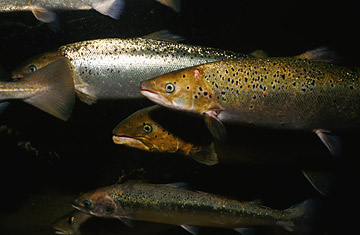
Atlantic salmon
Correction Appended: Feb. 5, 2009
Enjoy the grilled salmon on your dinner plate — it may not be on the menu for long. As the demand for seafood continues to rise, fueled in part by the now global appetite for sushi, we're in danger of fishing out the oceans. Once-teeming fishing territory like the Grand Banks off the eastern coast of Canada have gone fallow, and highly coveted species like the Atlantic cod and the bluefin tuna are becoming increasingly rare. An influential study published in 2006 in the journal Science predicted that if fishing around the world continued at its present pace, fish stocks would begin to decline, resulting in the final global collapse of wild fisheries, which could possibly happen as soon as mid-century.
Luckily, there's no secret to heading off a potential seafood apocalypse: Simply fish more sustainably, allowing fish stocks time to recover between harvests, just as a forest might be managed for logging. To that end, the U.N.'s Food and Agriculture Organization (FAO) in 1995 created the Code of Conduct for Responsible Fisheries, a voluntary guide to sustainable fishing — which means controlling illegal fishing, reducing excess fishing capacity and minimizing destructive practices like ghost fishing, when gear is left in the water after a ship departs, still killing sea life. If carried out, these guidelines could keep the world's fisheries productive for decades. (See pictures of tuna fish.)
That's a big if. Sustainable fishing remains far more theory than practice, according to an article published in the current issue of Nature. The study by the Fisheries Centre at the University of British Columbia (UBC), the Federal University of Rio Grande and the World Wildlife Federation looked at fishing policies and practices from the 53 countries that account for 96% of the world's fish catch, to see how well they followed the FAO's code. The results were sobering for anyone who enjoys a tuna steak: 28 countries, accounting for 40% of the world's fish catch, completely failed to follow the code. Only six countries had compliance scores above 60% — top performers were Norway and the U.S. — yet even these leaders failed to adhere to several aspects of the code. "We found it really disappointing," says Tony Pitcher, a professor in the department of zoology at UBC. "We didn't think it would be quite as bad as this, but this is what we found."
Unsurprisingly, rich nations — like Canada and the U.S. — tended to score highest in the study, with African, Asian and Latin American nations generally failing across the board. Nations with a history of corruption, such as Thailand and Indonesia, also scored poorly, which makes sense since proper fishing oversight requires not just regulations on the books, but a government willing to enforce them. But even a relatively scrupulous government offers no guarantee of fish-stock safety; Canada, Pitcher notes, has great fishing laws but in recent years, under a conservative government, they haven't always been executed. "It's not just intention that matters, but actual performance," Pitcher says. (See the top 10 food trends of 2008.)
That's the sort of attitude that needs to be brought to bear on global fishery management, lest wild fish disappear from our menu. The FAO code is valuable in principle, an excellent guide to a more sustainable fishing industry, but it's voluntary and lacks the teeth needed to save the world's fisheries. Of course, the very global nature of fishing, which often takes place outside any single nation's territory, makes it a classic tragedy of the commons. It's to the individual profit of any one fisherman, or any one nation, to keep fishing as long as possible — but if everyone abandons the code and fishes unsustainably, it will only hasten global fishery collapse.
There are other potential solutions — like putting a cap on fish catches, allocating shares in the quota and allowing fishermen to trade or sell those shares — which research suggests can lead to more sustainable fishing. But ultimately, Pitcher argues, we'll need a new enforceable legal agreement to govern the oceans. "We are approaching a point of no return for many of the world's fisheries," he says. "I know it's hard to get new international agreements, but we can't give up." Not unless we want to live — perish the thought — in a world without sashimi.
The original version of this article reported that the new study on sustainable fishing appeared in the journal Science. It appeared in Nature.
